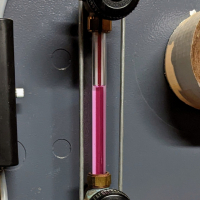Welcome! Here are the website rules, as well as some tips for using this forum.
Need to contact us? Visit https://heatinghelp.com/contact-us/.
Click here to Find a Contractor in your area.
Gas Piping
Options

Alan (California Radiant) Forbes
Member Posts: 4,002
We were installing a gas seismic valve at the gas meter today and when I was de-threading the nipple out of the wall, it didn't feel right. You know what it's supposed to feel like after you do this for awhile, no? Anyway, just as the nipple got to the last thread, I felt the fitting in the wall slip away.
This is what I saw when I looked through the hole.

This is what I saw when I looked through the hole.

8.33 lbs./gal. x 60 min./hr. x 20°ΔT = 10,000 BTU's/hour
Two btu per sq ft for degree difference for a slab
Two btu per sq ft for degree difference for a slab
0
Comments
-
the electrical service grounded to the gas line?Bob "hot rod" Rohr
trainer for Caleffi NA
Living the hydronic dream0 -
Or gas line bonded (grounded) to electric service??
NEC requires any metallic piping, ductwork etc that could be energized to be bonded to the electric grounding electrode system........this is seldom done.....often overlooked.
Or this was a mechanical clamp/fastener to keep the gas piping from being pulled out too far of the outside wall??0 -
-
I've dethreaded a few things...
I think you mean unscrewing.Single pipe quasi-vapor system. Typical operating pressure 0.14 - 0.43 oz. EcoSteam ES-20 Advanced Control for Residential Steam boilers. Rectorseal Steamaster water treatment0 -
I'll find out more in the morning when I open up the wall, but i think that's a grounding clamp. Around here, it has to be exposed and not buried in the wall.8.33 lbs./gal. x 60 min./hr. x 20°ΔT = 10,000 BTU's/hour
Two btu per sq ft for degree difference for a slab0 -
geez, always something. Good luck0
-
Guess it's the threads looking shiny. Thought the pipe broke0
-



8.33 lbs./gal. x 60 min./hr. x 20°ΔT = 10,000 BTU's/hour
Two btu per sq ft for degree difference for a slab0 -
What's the black and red thing on the pipe by the meter?
Single pipe quasi-vapor system. Typical operating pressure 0.14 - 0.43 oz. EcoSteam ES-20 Advanced Control for Residential Steam boilers. Rectorseal Steamaster water treatment0 -
8.33 lbs./gal. x 60 min./hr. x 20°ΔT = 10,000 BTU's/hour
Two btu per sq ft for degree difference for a slab2 -
@Alan (California Radiant) Forbes As you know I'm a DIYer so I'm asking this out of curiosity, not to be insulting.
I thought you were never supposed to wrench a pipe or nipple without having a wrench on the fitting as well? I don't see how that fitting could have been supported by a wrench without opening the wall before hand.
Is this more of a "goes by feel" rather than a hard rule?Single pipe quasi-vapor system. Typical operating pressure 0.14 - 0.43 oz. EcoSteam ES-20 Advanced Control for Residential Steam boilers. Rectorseal Steamaster water treatment0 -
@ChrisJ No problem with the questions.
You're absolutely right with "backing up" a fitting when screwing in a nipple and in this case, the backing up was done by the rest of the piping in the wall and floor. I could tell that the elbow was fully supported.
If I'd felt that there would be a problem, I would have removed more sheetrock to make room for a wrench on the pipe or fitting.8.33 lbs./gal. x 60 min./hr. x 20°ΔT = 10,000 BTU's/hour
Two btu per sq ft for degree difference for a slab0 -
-
Chris if the piping is secure, no need for a second wrench. It doesn’t take a lot of torque to tighten a nip. If there’s a chance to unspin something you don’t want to in spin, then yes, two tools
Identifying “secure” might be a challenge for some people. Just basic leverage stuff1
Categories
- All Categories
- 85.2K THE MAIN WALL
- 3.1K A-C, Heat Pumps & Refrigeration
- 55 Biomass
- 424 Carbon Monoxide Awareness
- 73 Chimneys & Flues
- 1.9K Domestic Hot Water
- 5.2K Gas Heating
- 130 Geothermal
- 160 Indoor-Air Quality
- 3.3K Oil Heating
- 61 Pipe Deterioration
- 885 Plumbing
- 5.9K Radiant Heating
- 376 Solar
- 14.7K Strictly Steam
- 3.2K Thermostats and Controls
- 59 Water Quality
- 49 Industry Classes
- 89 Job Opportunities
- 28 Recall Announcements




